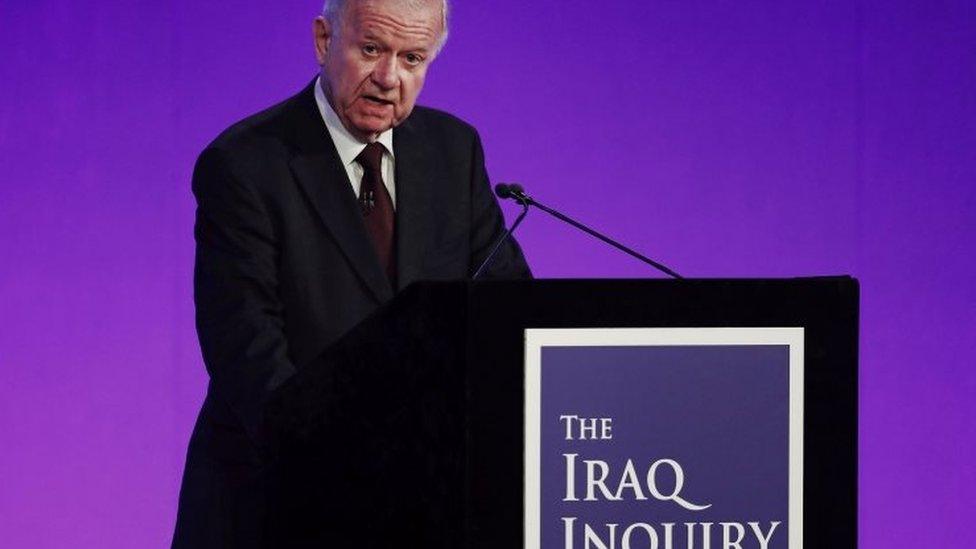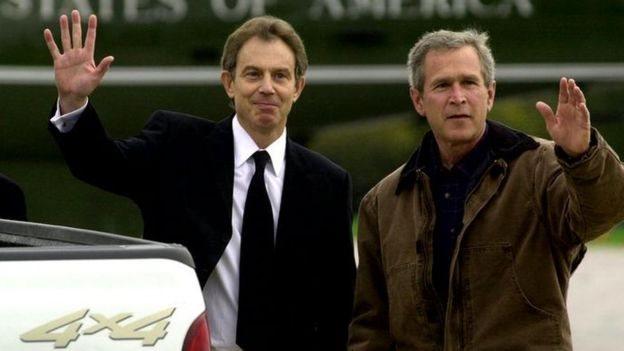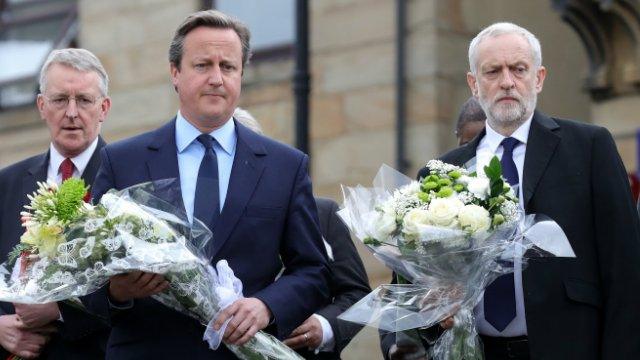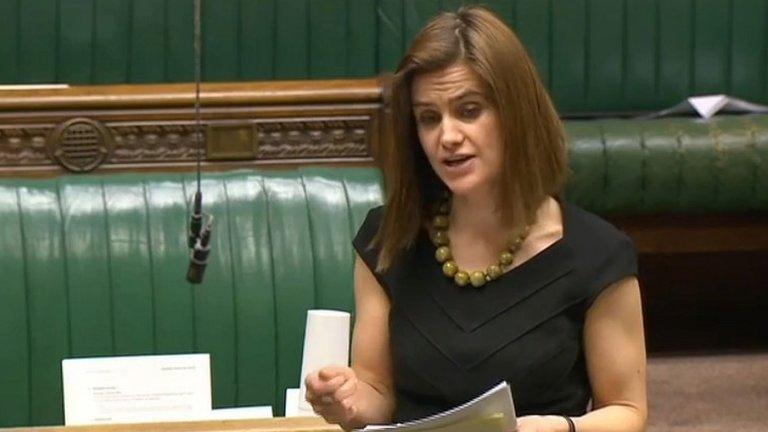Week ahead
- Published
- comments

Tony Blair overstated the threat posed by Saddam Hussein, sent ill-prepared troops into battle and had "wholly inadequate" plans for the aftermath, the UK's Iraq War inquiry said
It's Chilcot week - with major debates in both House of Parliament.
But elsewhere the sense of political limbo persists across Westminster, with a light legislative load, and much attention devoted to the leadership issues in both main parties.
And while the issues raised by the Brexit vote are starting to crop up in select committee land, and in odd corners of the Commons agenda (see Tom Brake's 10-minute rule bill on Tuesday) there's no sign of MPs being allowed to debate them at length, as peers did, last week.
There seems to be little appetite in the government to uncork that particular genie, until a new Conservative leader and prime minister has been enthroned.
Here's my rundown of the week ahead:
Monday
In the Commons (from 2.30pm), MPs open with Work and Pensions questions. As usual, the slot immediately afterwards (3.30pm) is primetime for any urgent questions or ministerial statements.
Then MPs turn to the detail of the Wales Bill - which aims to give effect to the government's policy of establishing a 'reserved powers' model for devolution to Wales. Labour's new shadow Welsh secretary Paul Flynn will be pushing amendments to give the Welsh Assembly more legislative elbow room where its law making might impinge on policy areas reserved to Westminster.
Plaid Cymru's attention will focus on three key amendments - full devolution of energy and the Crown Estate, which includes offshore exploitation rights, and is already devolved in Scotland; the devolution of policing (devolved in Scotland and Northern Ireland) and the devolution of Air Passenger Duty. Interestingly, Cardiff Airport sits within the Secretary of State for Wales' constituency so his response will be interesting.
The adjournment debate, led by the Labour MP Ben Bradshaw, is on Great Western Railway's bicycle policy.
In Westminster Hall (4.30pm - 7.30pm), MPs debate e-petition 129698 which complains that in 2013 the government changed the law on parents taking their children out of school in term time - so that now they would face a £60 of per child penalty fine - in effect preventing families from taking term time holidays forcing them to pay extra during school holidays.
Select committee hearing of the day is the Public Accounts Committee hearing on HS2 (4pm). The PAC has previously raised concerns about the ambitious timetable to deliver the scheme and will hear from the Department of Transport's permanent secretary and HS2 officials about options for putting back the opening date for phase one, and possible cost-cutting measures.
In the Lords (from 2.30pm) the usual half hour of questions to ministers is followed by the first day of detailed committee stage scrutiny of the Investigatory Powers Bill - peers will examine Clauses 1-57 and Clauses 221-231, which cover General Privacy Protections and the rules for lawful interception of communications.
Look out for a "probing" amendment (ie an amendment designed to get a response from the minister, rather than be forced to a vote) from the veteran Lib Dem, Lord Beith, who wants to tease out whether the government still holds to the "Wilson Doctrine" on security service bugging of MPs - the former Labour prime minister said he would disclose such bugging to the Commons when the moment was right to do so...
There will also be a short debate on combating caste-based discrimination in the UK - led by the crossbencher, Lord Harries of Pentregarth.
Those following the bill to approve HS2 will want to keep an eye on the bill committee hearing at 2pm, when MP Cheryl Gillan will seek to present a petition against the scheme, and the committee will decide whether she and other objectors have a "locus" which will allow their views to be considered - the HS2 company is pressing for a ruling that they do not.
Tuesday
The Commons meets at 11.30am for Foreign Office questions - will this be Phillip Hammond's last outing as foreign secretary?
Then there's a Ten Minute Rule Bill from the Lib Dem Tom Brake on EU citizens' resident in the United Kingdom right to live in the UK - he says the failure to clarify their position in the wake of the EU referendum is "cruel and unfair."
The day's main debate will be on an Opposition motion, to be announced. Fresh from winning their motion on the right to remain last week, what will Labour try this time?
The adjournment debate, led by the Conservative Peter Aldous, is on the future funding of supported housing.
My select committee pick of the day is the Public Administration Committee hearing (9.45am) on unsafe discharge from hospital, with evidence from the Alzheimer's Society, Independent Age, BMA, NHS Confederation, the RCN and NHS England; followed by Health Minister Ben Gummer,
In Westminster Hall there are debates on: children's early years development and school readiness (9.30am-11am); compensation for rail passengers (11am-11.30am); the performance of North Middlesex University Hospital NHS Trust (2.30pm-4pm); free childcare for three and four-year olds (4pm-4.30pm) and the report by the Milton Keynes Futures 2050 Commission and developing the Oxford - MK - Cambridge arc (4.30pm-5.30pm).
In the Lords (2.30pm) questions to ministers will be followed by a rapid rubber-stamping of the Supply and Appropriation (Main Estimates) Bill which will whiz through all its Lords stages of consideration - peers normally don't interfere with explicit money bills.
Then the House debates the Chilcot report on Iraq - watch out for contributions from Blair-era ministers who were involved.
It might also be worth keeping half an eye on the Moses Room (peers' equivalent of Westminster Hall) where two combined authority orders on the election of mayors covering Halton, Knowsley, Liverpool, St Helens, Sefton and the Wirral, and the Tees Valley, are up for debate.
Westminster has started to notice that the unfolding devolution process in England is really rather important. With the government aiming to hold elections for large numbers of the new super-mayors next May, quite a lot of these orders will have to be dealt with by November - the cut-off date for creating posts for election then.
Wednesday
In the Commons (from 11.30am) MPs open with questions, followed at noon by Prime Minister's questions.
There will be a Ten Minute Rule Motion on the NHS from the Labour MP Margaret Greenwood and then MPs move on to debate the Chilcot Report and the verdict of the inquiry into the Iraq war - this is the start of a two day mega-debate.

In a memo that many critics of the former prime minister have focused on, written in 28 July 2002, Tony Blair assured US President George W Bush he would be with him "whatever"
Watch out for the opening moves by parliamentary campaigners who are determined to find some way of punishing former Prime Minister Tony Blair for his role; they are actively exploring a number of possibilities from motions to strip him of his Privy Council membership - he'd no longer be Right Honourable - to reviving the ancient parliamentary practice of impeachment, last successfully deployed against Pitt the Younger's right hand man, Henry Dundas, in 1806.
The adjournment debate on the Tay cities deal is led by the SNP's Chris Law.
Select committee of the day is the Energy and Climate Chance session (2pm) with ministers, to ask if the government plans to abandon EU targets to get more heat and transport energy from renewables.
In Westminster Hall, MPs debate the implications for the UK steel industry of the outcome of the EU referendum (9.30am-11am); awareness and funding for treatment of Stevens Johnson Syndrome and Toxic Epidermal Necrolysis (11am-11.30am); the performance of the Govia Thameslink rail service (2.30pm-4pm); transport infrastructure in South Manchester (4pm-4.30pm) and whistleblowing in the NHS and the Capsticks report into Liverpool Community (4.30pm-5.30pm)
In the Lords (3pm) peers continue their detailed committee stage debate on the Investigatory Powers Bill. This is day two of six and peers will focus on Clauses 58-92, which cover the procedures for authorisation for obtaining communications data and the rules on retention of communications data.
Thursday
In the Commons the day begins, (at 9.30am) with Energy and Climate Change questions, followed by the weekly Business Statement from the Leader of the House, Chris Grayling.
Then the debate on the Chilcot report moves into day two.
The adjournment debate is on Section 136 of the Mental Health Act 1983 - led by the Conservative Sir Paul Beresford.
Select committee hearing of the day is the Home Affairs Committee's continuation (1.15pm) of its anti-Semitism inquiry, with evidence from the UK's Jewish communities, including the Chief Rabbi of the United Hebrew Congregations of the Commonwealth, the Jewish Leadership Council, and John Mann, Chair of the All-Party Parliamentary Group against anti-Semitism
In Westminster Hall there are debates on the contribution of cooperatives to the economy (1.30pm-3pm) and maternity discrimination (3pm-4.30pm).
In the Lords (11am) watch out for the question on the constitutional implications of the Supreme Court's 2014 judgment in the case of R (Nicklinson) v Ministry of Justice - from the crossbencher Baroness Meacher. The ruling declared that the UK's general prohibition of assisted suicide was incompatibility with European human rights law.
The day's main debates are on the causes of poverty in the United Kingdom, led by the Big Issue founder and crossbench peer Lord Bird, and on resourcing and staffing courts in supporting the rule of law led by the former Lord Chief Justice, Lord Woolf.
There will also be a short debate on the future status of EU citizens lawfully resident or working in the UK, when the UK leaves the EU.
Neither House sits on Friday.
- Published17 June 2016

- Published17 June 2016
